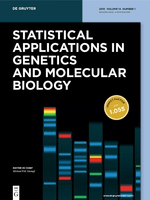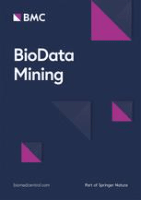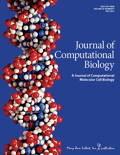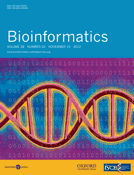
GigaScience
Scope & Guideline
Advancing Data-Driven Science for a Healthier Tomorrow
Introduction
Aims and Scopes
- Genomic and Metagenomic Research:
The journal publishes studies that utilize genomic and metagenomic approaches to explore genetic diversity, evolution, and adaptation in various organisms, including plants, animals, and microorganisms. - Computational Biology and Bioinformatics:
GigaScience emphasizes the development and application of computational tools and frameworks for the analysis and interpretation of biological data, including machine learning, data integration, and visualization techniques. - Open Data and Reproducibility:
The journal advocates for open science principles, including the sharing of datasets and methodologies to enhance reproducibility and collaboration in research, making data accessible for further studies. - Environmental and Ecological Genomics:
Research focusing on the impact of environmental factors on genetic diversity and adaptation is a core area, highlighting the relationship between organisms and their habitats. - Innovative Methodologies and Tools:
GigaScience features papers that introduce novel methodologies and tools that advance the field of biology, particularly those that facilitate high-throughput data analysis and integration.
Trending and Emerging
- Machine Learning in Biology:
The application of machine learning techniques to biological data analysis is rapidly increasing, with papers focusing on predictive modeling, data integration, and pattern recognition becoming more prevalent. - Environmental Genomics:
Research exploring the genomic basis of adaptation to environmental changes is gaining traction, particularly in the context of climate change and ecological resilience. - High-Throughput and Single-Cell Technologies:
The rise in studies utilizing high-throughput sequencing and single-cell analysis reflects a growing interest in understanding cellular heterogeneity and complex biological systems. - Data Sharing and FAIR Principles:
There is an increasing emphasis on the principles of Findable, Accessible, Interoperable, and Reusable (FAIR) data, with studies focusing on enhancing data management and sharing practices. - Integration of Omics Data:
The trend towards integrating multiple omics data types (genomics, transcriptomics, proteomics, etc.) into cohesive analyses is becoming a focal point, as researchers seek comprehensive insights into biological processes.
Declining or Waning
- Traditional Genetic Studies:
As the focus shifts towards high-throughput sequencing and genomic data analysis, traditional genetic studies that rely on less complex methodologies have seen a decline in publication frequency. - Single-Omics Approaches:
The trend towards multi-omics integration has overshadowed single-omics studies, leading to fewer publications that focus solely on genomics, transcriptomics, or proteomics without integrating other data types. - Basic Biodiversity Surveys:
Research that primarily catalogs biodiversity without integrating genomic insights or advanced analytical techniques is becoming less common, as the field moves towards more impactful studies that link biodiversity to genomic data.
Similar Journals

Briefings in Functional Genomics
Connecting Research and Discovery in GenomicsBriefings in Functional Genomics, published by Oxford University Press, serves as a crucial academic resource in the fields of biochemistry, genetics, and molecular biology. With an ISSN of 2041-2649 and an E-ISSN of 2041-2657, this esteemed journal explores innovative research and developments in functional genomics, with a commitment to advancing our understanding of genetic processes and their implications in health and disease. Ranking in the Q2 quartile for both Biochemistry and Genetics, and occupying a prominent Q1 status in the domain of interdisciplinary Medicine, the journal is positioned as a leading platform for researchers seeking to disseminate their findings to a global audience. Although it does not currently offer open access options, its accessibility through institutional subscriptions and its esteemed impact factor underscore its importance in the research community. Covering converging topics from 2010 to 2024, Briefings in Functional Genomics not only keeps pace with the rapidly evolving landscape of genomics but also stimulates collaboration and dialogue among scientists and industry professionals alike, making it an indispensable tool for researchers, practitioners, and students eager to engage with cutting-edge genomic science.

Synthetic Biology
Advancing Research in Synthetic Biology and BeyondSynthetic Biology, published by Oxford University Press, is a leading open-access journal that has gained recognition since its inception, becoming a pivotal platform in the fields of Agricultural and Biological Sciences, Bioengineering, Biomaterials, Biomedical Engineering, and Biotechnology. With an ISSN of 2397-7000 and consistent contributions from innovative researchers, the journal has established itself as a Q1 journal in Agricultural and Biological Sciences and ranks notably across various engineering disciplines, making it an essential resource for cutting-edge research and interdisciplinary collaboration. Since becoming fully open access in 2016, it has broadened its reach, allowing easy access to groundbreaking findings that drive advancements in synthetic biology and its applications. The journal's commitment to high-quality, peer-reviewed content serves to inspire researchers, professionals, and students alike, fostering a rich academic community dedicated to exploring the complexities of biological systems and their synthetic counterparts.

Bioinformatics Advances
Charting New Territories in BioinformaticsBioinformatics Advances, published by Oxford University Press, is an esteemed academic journal that serves as a vital platform for the dissemination of innovative research in the rapidly evolving fields of bioinformatics and computational biology. With a promising E-ISSN of 2635-0041, this journal has made significant strides since its inception in 2021, achieving a commendable Q1 ranking in both the Computer Science Applications and Genetics categories, alongside respectable Q2 rankings in Molecular Biology and Structural Biology as of 2023. Though currently not an open-access publication, its critical insights cater to an audience keen on advancing knowledge and technology in genomic studies and data analytics. The journal emphasizes high-quality research and aims to facilitate the integration of computational techniques within biological sciences, making it an essential resource for researchers, professionals, and students alike who seek to stay at the forefront of bioinformatics advancements.

Biology Methods & Protocols
Bridging gaps in biological research through shared expertise.Biology Methods & Protocols is a pioneering open-access journal published by Oxford University Press, dedicated to advancing the field of biological research through the dissemination of cutting-edge methodologies and protocols. Since its inception in 2016, the journal has established a prominent presence in the academic community, achieving an impressive Q1 ranking in Agricultural and Biological Sciences (miscellaneous) and a Q2 ranking in Biochemistry, Genetics, and Molecular Biology (miscellaneous) as of 2023. With a Scopus rank that places it among the top 69% in its field, the journal serves as an essential resource for researchers, practitioners, and students seeking reliable and innovative techniques for their experiments. The publication not only promotes the sharing of high-quality protocols that can be readily adopted in laboratories globally but also encourages collaboration and knowledge sharing among scientists. Embracing an open-access model, Biology Methods & Protocols ensures that vital advancements in biological methodologies are accessible to all, thereby fostering a more inclusive scientific community.

Statistical Applications in Genetics and Molecular Biology
Transforming Data into Biological BreakthroughsStatistical Applications in Genetics and Molecular Biology, published by WALTER DE GRUYTER GMBH, serves as a vital academic platform for researchers and professionals dedicated to the integration of statistical methodologies within the fields of genetics and molecular biology. Established in Germany, this interdisciplinary journal, with an ISSN of 2194-6302 and E-ISSN 1544-6115, seeks to bridge the gap between statistical theory and biological applications, making it an essential reading for those engaged in data analysis, biological research, and computational methods. Despite its current Q4 ranking in key categories such as Computational Mathematics and Genetics, the journal continues to strive for academic rigor and relevance, addressing contemporary challenges and advancements in the field. The journal encourages the submission of high-quality, peer-reviewed research that showcases innovative statistical approaches to genetic and molecular data, providing valuable insights and fostering collaboration among scientists. Exploratory or applied studies that demonstrate effective statistical applications are particularly welcomed, ensuring that both novel and established methodologies are discussed, alongside practical case studies that advance the understanding of biological phenomena. As an open-access journal, it aims to widen the accessibility of cutting-edge research, emphasizing the importance of transparency and sharing knowledge among the scientific community.

BioData Mining
Empowering Research Through Open Access InsightsBioData Mining is a distinguished open access journal published by BMC, focusing on the dynamic intersection of bioinformatics, computational mathematics, and molecular biology. Since its inception in 2008, this journal has provided a critical platform for researchers and professionals to publish their findings, contributing significantly to the collective knowledge in fields such as biochemistry, computational theory, and genetics. With a robust impact factor and a commendable h-index, BioData Mining continues to be a vital resource for academic and industrial advancements, ranked in the top quartiles in various categories according to the 2023 metrics. The journal's commitment to open access ensures that cutting-edge research is readily available to the global scientific community, thereby enhancing visibility and fostering collaboration among scholars. Whether you are a researcher, student, or practitioner, engaging with BioData Mining will equip you with relevant insights and developments in the fast-evolving realm of bioinformatics.

JOURNAL OF COMPUTATIONAL BIOLOGY
Empowering Researchers with Cutting-edge Computational Biology InsightsJOURNAL OF COMPUTATIONAL BIOLOGY, published by Mary Ann Liebert, Inc., serves as a premier platform for the dissemination of groundbreaking research at the intersection of biological sciences and computational methods. Established in 1994, this journal provides a valuable resource for researchers, professionals, and students interested in the evolving fields of computational mathematics and biology. With a commendable Q2 ranking in several pertinent categories such as Computational Mathematics and Modeling and Simulation, it emphasizes high-quality studies that propel understanding and innovation in these areas. Although the journal currently operates under traditional access options, it plays a crucial role in fostering scholarly communication and collaboration among a diverse audience, advancing knowledge in genetics, molecular biology, and beyond. The journal's continual evolution, with a commitment to publish until at least 2024, positions it as a critical resource in the fast-paced world of computational biology.

BIOINFORMATICS
Exploring the Synergy of Data and Life SciencesBIOINFORMATICS, published by Oxford University Press, is a leading journal in the realms of biochemistry, computational mathematics, and computer science, with a notable impact factor that underscores its significance in the field. Since its inception in 1985 and continuing through its expected convergence in 2024, the journal has maintained a prestigious reputation, proudly residing in the Q1 category across multiple disciplines, including molecular biology and statistics. With a Scopus ranking placing it within the top percentiles of its categories, BIOINFORMATICS serves as an essential platform for disseminating high-quality research that advances knowledge and innovation at the intersection of biology and computational sciences. This journal not only offers both subscription and open access options, ensuring wider availability of its cutting-edge research, but it has also become a crucial resource for researchers, professionals, and students aiming to stay at the forefront of bioinformatics and related fields. Explore the latest findings and trends that define the future of biological research through this esteemed publication, any inquiries regarding the journal can be directed to its offices located at Great Clarendon St, Oxford OX2 6DP, England.

Evolutionary Bioinformatics
Advancing the frontiers of evolutionary research.Evolutionary Bioinformatics, published by SAGE Publications Ltd, is a pioneering open-access journal established in 2005, dedicated to advancing the field of evolutionary biology through innovative computational techniques and bioinformatics. With an ISSN of 1176-9343, it serves as a critical platform for researchers, professionals, and students to disseminate impactful findings and foster collaboration across disciplines. The journal spans a broad scope, contributing significantly to the areas of Ecology, Evolution, Behavior and Systematics, and Genetics, as evidenced by its respectable Scopus rankings and quartile placements in 2023. With a commitment to providing comprehensive, peer-reviewed research articles and tools for sharing knowledge, Evolutionary Bioinformatics plays an essential role in shaping the future of evolutionary studies and bioinformatics. Readers and contributors alike are encouraged to engage with cutting-edge research that pushes the boundaries of understanding in this dynamic field.

Frontiers in Bioinformatics
Fostering Collaboration for Breakthrough DiscoveriesFrontiers in Bioinformatics is a leading academic journal dedicated to advancing the field of bioinformatics by publishing high-quality research and review articles. Published by FRONTIERS MEDIA SA, this open-access journal aims to foster innovative research, promote collaborative initiatives, and provide a platform for the dissemination of findings related to computational biology, biostatistics, and the intersection of bioinformatics with other biological disciplines. With a focus on promoting accessibility and visibility of research, Frontiers in Bioinformatics operates under a rigorous peer-review process, ensuring that all published content meets the highest academic standards. The journal has shown a commendable rank across various Scopus categories, including Mathematics, Computational Mathematics, and multiple dimensions of Biochemistry and Molecular Biology, indicating its relevance and impact within the research community. Researchers, professionals, and students will find this journal invaluable for staying abreast of the latest developments and breakthroughs in bioinformatics, enhancing their studies and professional projects.